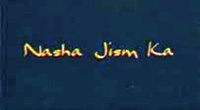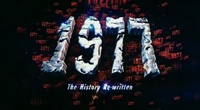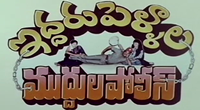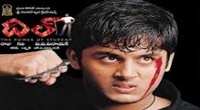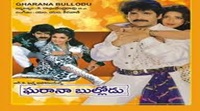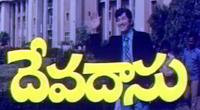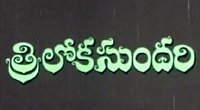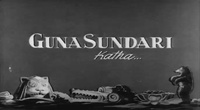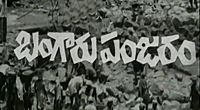La haine (French pronunciation: ?, Hate) is a 1995 French black-and-white drama film written, co-edited, and directed by Mathieu Kassovitz. It is commonly released under its French title in the English-speaking world, although its U.S. VHS release was titled Hate. It is about three young friends and their struggle to live in the banlieues of Paris. The title derives from a line spoken by one of them, Hubert, "La haine attire la haine!", "hatred breeds hatred."
| La Haine | |
|---|---|
La haine cover, with the tagline Jusqu'ici tout va bien… ("So far, so good…") | |
| Directed by | Mathieu Kassovitz |
| Produced by | Christophe Rossignon |
| Written by | Mathieu Kassovitz |
| Starring | Vincent Cassel Hubert Koundé Saïd Taghmaoui |
| Music by | Assassin |
| Cinematography | Pierre Aïm |
| Edited by | Mathieu Kassovitz Scott Stevenson |
| Distributed by | Canal+ |
Release date |
|
Running time | 98 minutes |
| Country | France |
| Language | French |
| Budget | $2.6 million |
| Box office | $15.3 million |
Screenplay
The film depicts approximately 20 consecutive hours in the lives of three friends in their early twenties from immigrant families living in an impoverished multi-ethnic French housing project (a ZUP – zone d'urbanisation prioritaire) in the suburbs of Paris, in the aftermath of a riot. Jewish Vinz (Vincent Cassel) is filled with rage. He sees himself as a gangster ready to win respect by killing a police officer, manically practising the role of Travis Bickle from the film Taxi Driver in the mirror secretly. His attitude towards police is a simplified, stylized blanket condemnation, also to individual police officers who make an effort to steer the trio clear of troublesome situations. Hubert (Hubert Koundé) is an Afro-French boxer and small-time drug dealer, the most mature of the three, whose gymnasium was burned in the riots. The quietest, most thoughtful and wisest of the three, he sadly contemplates the ghetto and the hate around him. He expresses the wish to leave his world of violence and hate behind, but does not know how since he lacks the means to do so. Saïd – Sayid in some English subtitles – (Saïd Taghmaoui) is an Arab Maghrebi who inhabits the middle ground between his two friends' responses to their place in life.
A friend of theirs, Abdel Ichaha, has been brutalized by the police shortly before the riot and lies in a coma. Vinz finds a police officer's .44 Magnum revolver, lost in the riot. He vows that if their friend dies from his injuries, he will use it to kill a cop, and when he hears of Abdel's death he fantasizes carrying out his vengeance.
The three go through an aimless daily routine and struggle to entertain themselves, frequently finding themselves under police scrutiny. After Vinz nearly shoots a riot police officer and the group narrowly escapes, they take a train to Paris but encounter many of the same frustrations, and their responses to interactions with both benign and malicious Parisians cause several situations to degenerate to dangerous hostility. A run-in with sadistic plainclothes police, during which Saïd and Hubert are humiliated and racially as well as physically abused, results in their missing the last train home and spending the night on the streets. They sleep in a shopping mall and wake to a news broadcast informing them that Abdel is dead. They travel to a roof-top from which they insult skinheads and policemen, before encountering the same group of racist anti-immigrant skinheads who begin to beat Saïd and Hubert savagely, now that the balance of power has shifted. Vinz arrives, and his gun allows him to break up the fight; all the skinheads flee except one (portrayed by Kassovitz himself) whom Vinz is about to execute in cold blood. His dream of revenge is thwarted by his reluctance to go through with the deed, and, cleverly goaded by Hubert, he is forced to confront the fact that his true nature is not the heartless gangster he poses as, and he lets the skinhead flee.
Early in the morning, the trio returns to the banlieue and split up to their separate homes, and Vinz turns the gun over to Hubert. However, Vinz and Saïd encounter a plainclothes police officer, whom Vinz had insulted earlier in the day whilst with his friends on a local rooftop. He grabs and threatens Vinz, making reference to the earlier incident on the roof. Hubert rushes to their aid, but as the police officer holding Vinz taunts him with a loaded gun held to Vinz's head, the gun accidentally goes off, killing Vinz instantly. Hubert and the police officer slowly and deliberately point their guns at each other, and as the film cuts to Saïd closing his eyes and cuts to black, a shot is heard on the soundtrack, with no indication of who fired or who may have been hit. This stand-off is underlined by a voice-over of Hubert's slightly modified opening lines ("It's about a society in free fall..."), underlining the fact that, as the lines say, jusqu'ici tout va bien ("so far so good"); all seems to be going relatively well until Vinz is killed, and from there no one knows what will happen, a microcosm of French society's descent through hostility into pointless violence.
- Vincent Cassel as Vinz
- Hubert Koundé as Hubert
- Saïd Taghmaoui as Saïd
- Marc Duret as Inspector Notre Dame
- Abdel Ahmed Ghili as Abdel
- François Levantal as Astérix (called Snoopy in some English editions)
- Tadek Lokcinski as Monsieur Toilettes
- Solo as Santo
- Héloïse Rauth as Sarah
- Choukri Gabteni as Nordeen, Saïd's brother
- Benoît Magimel as Benoît
- Medard Niang as Médard
- Arash Mansour as Arash
- Andrée Damant as The concierge
- Philippe Nahon as Police Chief
- Zinedine Soualem as Plainclothes Police Officer
- Vincent Lindon as Really Drunk Guy
- Karin Viard as Gallery Girl
- Peter Kassovitz as Gallery Patron
- Mathieu Kassovitz as Skinhead
Kassovitz has said that the idea came to him when a young Zairian, Makome M’Bowole, was shot in 1993. He was killed at point blank range while in police custody and handcuffed to a radiator. The officer was reported to have been angered by Makome's words, and had been threatening him when the gun went off accidentally. Kassovitz began writing the script on April 6, 1993, the day M'Bowole was shot. He was also inspired by the case of Malik Oussekine, a 22-year-old student protester who died after being badly beaten by the riot police after a mass demonstration in 1986, in which he did not take part. Oussekine's death is also referred to in the opening montage of the film. Mathieu Kassovitz included his own experiences; he took part in riots, he acts in a number of scenes and includes his father Peter in another.
The majority of the filming was done in the Parisian suburb of Chanteloup-les-Vignes. Unstaged footage was used for this film, taken from 1986–96; riots still took place during the time of filming. To actually film in the projects, Kassovitz, the production team and the actors, moved there for three months prior to the shooting as well as during actual filming. Due to the film's controversial subject matter, seven or eight local French councils refused to allow the film crew to film on their territory. Kassovitz was forced to temporarily rename the script Droit de Cité. Some of the actors were not professionals. The film has a documentary feel and includes many situations that were based on real events.
The music of the film was handled by French hardcore rap group Assassin, whose song "Nique La Police" (translated as "Fuck The Police") was featured in one of the scenes of the film. One of the members of Assassin, Mathias "Rockin' Squat" Crochon, is the brother of Vincent Cassel, who plays Vinz in the film.
The film is dedicated to those who died while it was being made.
Upon its release, La haine received widespread critical acclaim and was well received in France and abroad. The film was shown at the 1995 Cannes Film Festival where it enjoyed a standing ovation. Kassovitz was awarded the Best Director prize at the festival. The film had a total of 2,042,070 admissions in France where it was the 14th highest-grossing film of the year. Based on 25 reviews collected by Rotten Tomatoes, the film has an overall approval rating from critics of 100%, with an average score of 8/10. Kevin Thomas of the Los Angeles Times called the film "raw, vital and captivating". Wendy Ide of The Times stated that La haine is "One of the most blisteringly effective pieces of urban cinema ever made."
After the film was well received upon its release in France, Alain Juppé, who was Prime Minister of France at the time, commissioned a special screening of the film for the cabinet, which ministers were required to attend. A spokesman for the Prime Minister said that, despite resenting some of the anti-police themes present in the film, Juppé found La haine to be "a beautiful work of cinematographic art that can make us more aware of certain realities."
It was ranked #32 in Empire magazine's "The 100 Best Films of World Cinema" in 2010.
- Best Director (1995 Cannes Film Festival) - Mathieu Kassovitz
- Best Editing (César Awards) - Mathieu Kassovitz and Scott Stevenson
- Best Film (César Awards) - Mathieu Kassovitz
- Best Producer (César Awards) - Christophe Rossignon
- Best Young Film (European Film Awards) - Mathieu Kassovitz
- Best Foreign Language Film (Film Critics Circle of Australia Awards)
- Best Director (Lumières Award) - Mathieu Kassovitz
- Best Film (Lumières Award) - Mathieu Kassovitz
La haine was available on VHS in the United States, but was not released on DVD until The Criterion Collection released a 2-disc edition in 2007. The film has been shown on many Charter Communications Channels. Both HD DVD and Blu-ray versions have also been released in Europe, and Criterion released the film on Blu-ray in May 2012. The release includes audio commentary by Kassovitz, an introduction by actor Jodie Foster, "Ten Years of La haine", a documentary that brings together cast and crew a decade after the film's landmark release, a featurette on the film's banlieue setting, production footage, and deleted and extended scenes, each with an afterword by Kassovitz.
- List of French-language films
- Social situation in the French suburbs
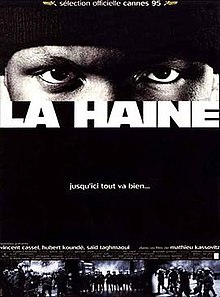 Story of movie La Haine :
Story of movie La Haine : 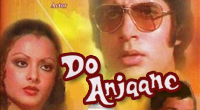
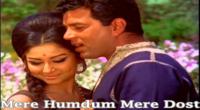
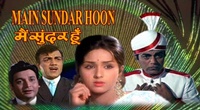
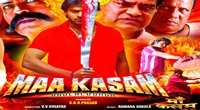
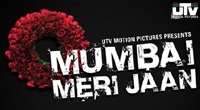
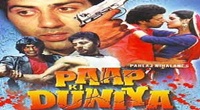
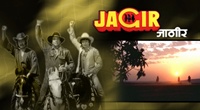
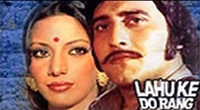

.jpg)

.jpg)
